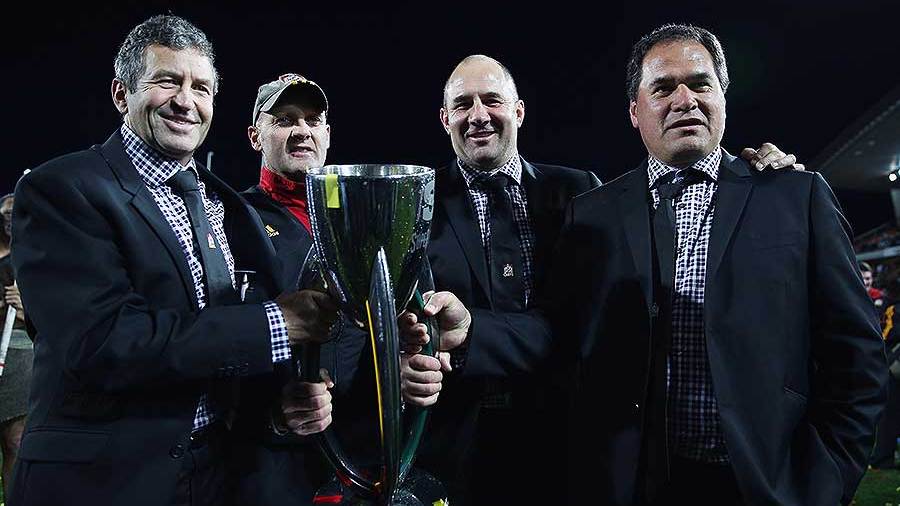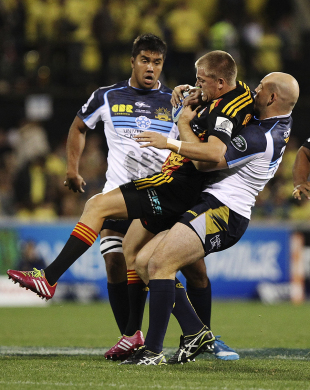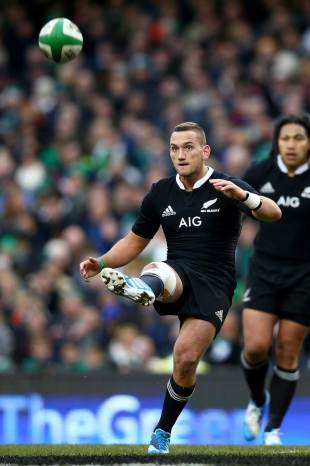|
The Coaches
Contact area now more combative: Dave Rennie
Brett McKay
April 30, 2014

Trophies alone do not measure coaching success, Dave Rennie tells ESPNscrum © Getty Images
Enlarge
We don't always get to hear about our top-level coaches these days, certainly not much beyond the usual "this bloke is rubbish"/ "this bloke's a genius" debate, but there's stories and insight to be provided that goes well beyond the standard cliches. In the first of a new series of interviews with the best clipboard-holders in the game, ESPNscrum had the pleasure of sitting down for a wonderfully candid one-on-one chat with Chiefs head coach Dave Rennie. ESPNscrum: You're in the middle of a tough run at the moment, aren't you? 
The Chiefs' progress has been held up in recent weeks
© Getty Images
Enlarge
Dave Rennie: Yeah, we're on a nine-week run. It started with the Stormers at home, and the Force away [before their South African tour], so yeah, we've spent a bit of time away. But, look, it's the same for everyone, and, gee, it's a tough comp, there's no easy games as you've seen. It's a really good competition [in 2014], and we're a bit frustrated because we've left a few points out on the park in the last few weeks. ESPNscrum: Have you ever had an injury list as long as you've got at the moment? Dave Rennie: We've probably consistently had this number out all year. When we played the Crusaders first up, we had 11 out and lost four more during the game. It's been a revolving door, you know; when you lose a couple one week but you get a couple back, and so on. But, yeah, it is a test of our depth. ESPNscrum: You came through the coaching ranks, obviously, but what's your coaching background? Dave Rennie: I'm a school teacher, so I've coached a hell of a lot, and a lot of different sports for a long time. I guess coaching and teaching are pretty similar. I sort of got into coaching rugby by coaching my kids. The local club I played for [in Upper Hutt, north of Wellington, was under pressure for a coach, so I ended up going there. And I did Wellington 'B' for three years, and then the Wellington Lions for four [in the ITM Cup - to the end of the 2002 season]. I got tipped out there, so I did a bit of contract work for Murray Mexted's International Rugby Academy New Zealand. I did about five years there, and during that same sort of period I coached Manawatu for six seasons and I coached the New Zealand Under-20s around the same time for three years [winning the Junior World Cup three times], and then the last couple of years in Hamilton. In amongst all that, I was with the Hurricanes in 2002 [as an assistant to Graham Mourie]. So, yeah, I guess I've been involved for a while. ESPNscrum: Your combination with Wayne Smith has been widely documented. What sort of value can you put on having a top assistant coach like him? Dave Rennie: We're really lucky. We've got four coaches, and all very experienced, and we're all sort of around 50. When I got the job at the Chiefs, I asked Tom [Coventry] and 'Straws' [Andrew Strawbridge] to come with me. 'Straws' I coached New Zealand 20s with for a couple of years, and Tom's a very experienced coach; he'd done Hawkes Bay for five of six years, and New Zealand Schools, and he's originally from the Waikato. 'Smithy' was a bonus, really, because we weren't really sure what he was going to do post-World Cup [in 2011]. Oh, he's a phenomenal coach; he'd be the best coach in the world, and so it's just great from my point of view. He's a really good man, but very analytical and really understands the value of culture in a group, and so on, and he's been huge for us. ESPNscrum: How do you go about putting together a coaching panel? Dave Rennie: The key things for me was, I think a mistake that some coaches make is that they surround themselves with guys who maybe won't challenge them and, for the want of a better term, 'yes men', and I was really conscious of that for us to be successful.
You want to surround yourself with hard-working good buggers, but guys who are prepared to challenge, and we've certainly got that in our environment here. So that was key, and it's not just from a coaching point of view. But I guess we're trying to create an environment where we going to be the best on the world, so that involves a fair bit of challenging and so on. But it's a good mix; we work hard, but we have a bit of fun as well and we enjoy what we do. ESPNscrum: How do you then measure success as a head coach? It's not just as simple as pointing to the two cups in the cabinet, is it? Dave Rennie: No, it's not, because a hell of a lot of work goes into achieving those titles. We won it first year [as a coaching group] and not many people thought we could. And even last year when we won it again, most people thought we'd fall over somewhere along the way. So there was a bit of motivation in that, in proving a few doubters wrong. It's not even about the titles, though. We've put a real focus on the community side of things, making our players accessible. Most people see that as a bit of a pain in the backside, having to do work in the community, but for us, it makes us stronger; it gives you an idea of who you are and who you represent. So we've done a lot of work in there and the change in attitude and even the change of expectations within the community has changed significantly. I think a few maybe a few years ago they were happy to win; now there's an expectation of how we win and a bit of pressure when we don't. So I think a lot of the work we've done around that, and the work we've done around our cultural side and tying in with Tainui [a Maori tribal confederation on the North Island] has been really important as well. I think, obviously in the long term, we'd probably measure success by where our players end up, maybe even from a life-skills point of view. We spend a fair bit of time trying to make sure they're planning for life out of footy, and some guys will end up with some really good contracts and earn some good money and set themselves up for life, so maybe that's looking back from 10 or 15 years' time. It may not be so much about how many titles we won, but the sort of life that the players we've worked with have gone on to have. Brumbies 41-23 Chiefs (video available only in Australia)
%]ESPNscrum: What about coaching trends within Super Rugby? What's changed in your time with the Chiefs? And even what's changed just this season? Dave Rennie: The competition's a lot closer, there's a hell of lot more depth in all sides. The Australian conference seems a lot more even than it has in previous years. I think the Kiwi conference has always been pretty close, you know; everyone beats everyone. But even the African sides, you look at how well the Lions have done this year, and so it is very even. I think as rules change, and different interpretations, the game alters a little bit. Certainly around the scrums this year, some teams have reacted to new engagements better than others; but it also kills a fair bit of time out of the game, which is probably a negative. But I think the big thing is the contact area. We probably had an edge in 2012, where we were able to generate really quick ball, and statistically over the last couple of years we've been No.1 in gain line and getting quick ball. But we've really noticed that it's a far more combative area for us, and maintaining the pill is far more of a challenge because a lot of teams have got some pretty smart strategies in and around slowing down your pill, or stealing it. So I think that whole contact area, it's really evened out and the sides that are clinical and are getting really quick ball are the ones that are the most difficult to deal with at the moment. 
Dave Rennie is proud of his long association with Aaron Cruden
© Getty Images
Enlarge
ESPNscrum: A simple one to finish with … who is the best player you've coached? Dave Rennie: Hmm, yeah. I've had the pleasure to work with a number of high-quality people, and obviously guys who have had stellar careers with the All Blacks. And that dates back to guys like Jonah [Lomu], and 'Cully' [Christian Cullen], and Tana Umaga, and so on with Wellington, and then these guys here [at the Chiefs], so, yeah, I probably wouldn't pick out one player. I've got a hell of a lot of respect for those guys, and Aaron Cruden especially, I suppose because I've worked with him when he was first out of school. He's pretty special because he's been through a bit in his life already [Cruden overcame testicular cancer aged 19], so he's very mentally tough. And that's the thing about him. Considering during the World Cup [in New Zealand, in 2011], he wasn't supposed to be a part of it, so he was in the stands drinking a few beers with his mates, and a week later he's in a semi-final against Australia and Pat McCabe's running into his channel all day and [Cruden's] knocking him over. He's a very tough kid, and obviously we've given him big leadership responsibilities since he's been here, and now he's got a captain's tag as well. He's certainly a very special player, and a guy I've got a ton of respect for, and it's been a pleasure to spend a few years working with him. © ESPN Sports Media Ltd
| |||||||||||||||
Live Sports
Communication error please reload the page.
-
Football
-
Cricket
-
Rugby
-
- Days
- Hrs
- Mins
- Secs
F1 - Abu Dhabi GP
Abu Dhabi Grand Prix December 11-131. Max Verstappen ()
2. Valtteri Bottas (Mercedes)
3. Lewis Hamilton (Mercedes)
4. Alexander Albon ()
5. Lando Norris ()
6. Carlos Sainz Jr ()
-
ESPNOtherLive >>
Boxing - Nelson v Wilson; Simmons v Dickinson; Joshua v Gavern (Metro Radio Arena, Newcastle)
Golf - Houston Open
Snooker - China Open
Tennis - Miami Open

